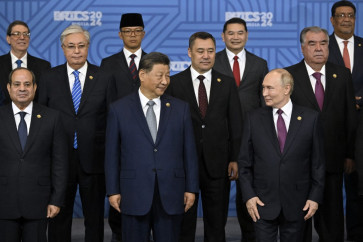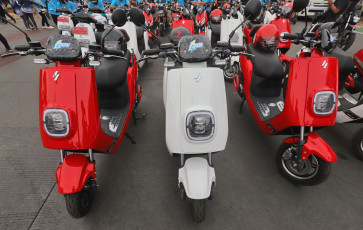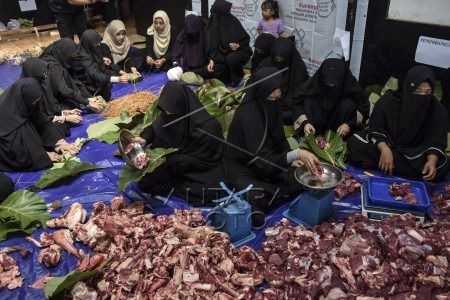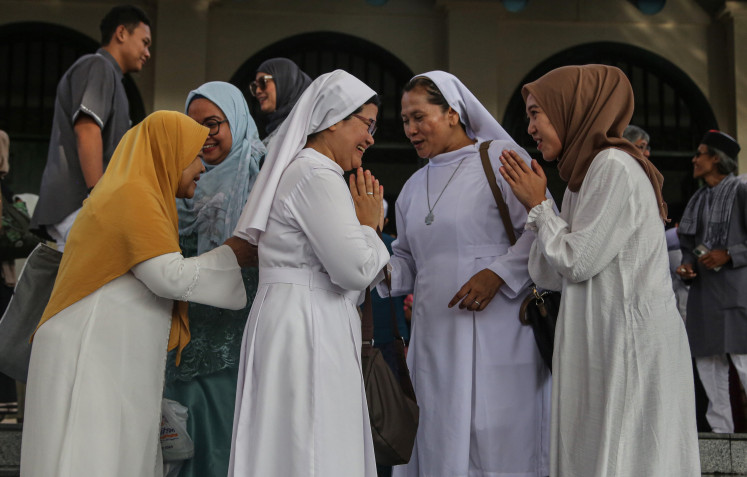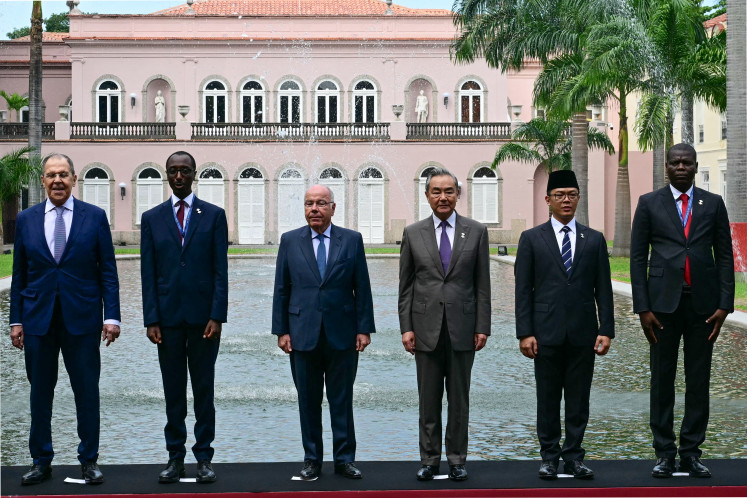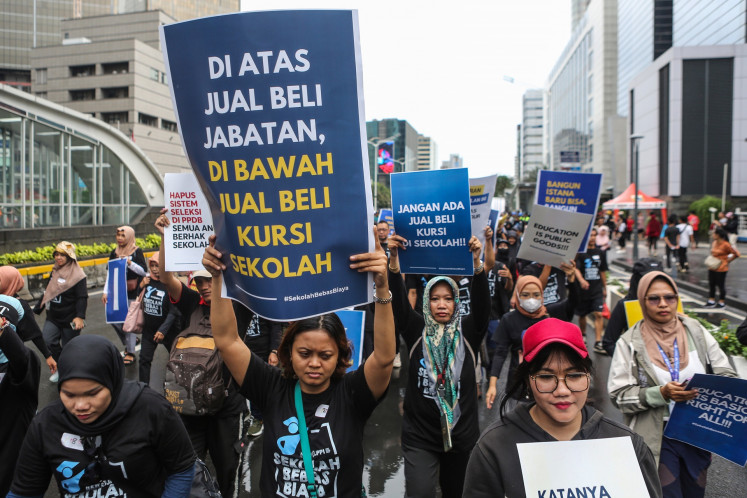18 years since May 1998, may we never forget
Rumors about Chinese Indonesian women being attacked, raped and killed by raging mobs ran through my brain. As we edged out of the house through the skewed gate, I thought, “How is our fate on the other side of the gate better than being burned inside the house?”
Change text size
Gift Premium Articles
to Anyone
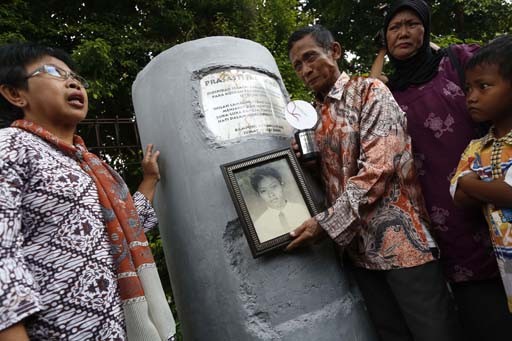 Never forgotten: R. Subiyanto (center), displays a picture of his son, Gunawan, one of over 1,000 victims of the May 1998 riots in Jakarta, with the parents of other victims who mostly perished in a fire that engulfed Yogya mall in Klender, East Jakarta. The picture was taken on May 19, 2013, in front of a memorial for the victims. No one has been held accountable for the riots, which took place in a number of cities. (JP/Jerry Adiguna)
Never forgotten: R. Subiyanto (center), displays a picture of his son, Gunawan, one of over 1,000 victims of the May 1998 riots in Jakarta, with the parents of other victims who mostly perished in a fire that engulfed Yogya mall in Klender, East Jakarta. The picture was taken on May 19, 2013, in front of a memorial for the victims. No one has been held accountable for the riots, which took place in a number of cities. (JP/Jerry Adiguna)
I
t was one dull thud, at first. Unnoticeable somewhat to the ear, but you could feel it on your skin.
Then came another, and another, and many others, and then the piercing sound of shattered glass, followed by screams.
I ended my email to my friend, saying I had to go because my house was being attacked.
As the screams became louder and rowdier, and as more rocks flew into my house, I ran downstairs and saw my father. “Turn off the lights! Stay inside!” he said. Behind him were several small bags, filled with important documents he had prepared the previous week, immediately after the news that several Trisakti University students had been shot dead on May 12.
I grabbed my passport and the little money in my wallet and then wondered if I should even bother with ATM cards with all the reports of lootings.
My aunt and uncle with my two younger sisters were already at the far corner of the house. The rocks kept coming. Clanking and scraping of metal. “They’re pulling down the gate,” Dad whispered.
The sun soon faded, no more rocks. Just random sounds, faint chants. It felt like a million years before Dad came and told us to get out of the house quickly, because he could smell gasoline from outside.
The chants became screams, “Bakar [burn]! Bakar! Bakar!”, as we anxiously headed toward the gate. Our 3-meter high metal gate had been derailed but not yet breached. The gate was tougher than the mob.
I could see thick black smoke coming from the looted minimart across the street. Rumors about Chinese Indonesian women being attacked, raped and killed by raging mobs ran through my brain. As we edged out of the house through the skewed gate, I thought, “How is our fate on the other side of the gate better than being burned inside the house?” I glanced at the faces of my sisters and tried to suppress all kinds of ominous thoughts.
Young men, high schoolers, I assumed, with genuine hatred were screaming insults like, “Cina anjing! [Chinese dogs]!”, pushing us, hitting us, kicking and spitting on us and throwing sandals, garbage, whatever they had at hand. Dad’s face was like I’d never seen it before.
Heads down, we moved cautiously away. With each hand or foot that touched any part of my body, I felt like throwing up. I frantically peered around trying to keep my sisters in sight as we were pushed and kicked around. A few of the men stopped and flew into the house.
Out of nowhere, a tiny old lady appeared. A few more people came and formed a human barricade. The lady yelled at the mob, said they better stop because pak Lurah ( the subdistrict chief ) and pak Ustadz ( the cleric ) were coming. Come they did. We were lucky.
I can’t remember their faces anymore. That mob of livid teens. But I remember their warm spit on my face, on my chest. I can’t remember the old lady’s face anymore, nor those of the small human barricade. But I remember the sweet sense of safety in my chest, in my stomach. We were very lucky.
May 1998 changed my life. It changed Indonesia.
Before, I was the “typical middle-class Chinese Indonesian”, over-simplified and stereotyped as apolitical, an economic animal and racist. Afterwards, I became a livid Chinese Indonesian and desperately wanted to escape my homeland. Being awarded an Australian government scholarship to Canberra was a blessing, I thought.
But the true gift was meeting a lot of gracious people — Indonesians, Australians and others — that inspired and encouraged me to be part of the ongoing discourse about the tragic events of May 1998, of the exhilarating reformasimovement toward becoming a new Indonesia. So I decided not to escape but to join in the fight with the very little I could offer.
Endeavors to seek justice and to ensure that May 1998 never happens again had earlier shifted into high gear. But after a certain period of governmental and social apathy, they have begun to run out of steam. Several notable Chinese Indonesian activists have moved on to other human rights issues, Chinese Indonesian associations have become less involved in, if not outright dismissive of, May 1998-related events. Those in power have made promises, but none of them have been fulfilled — some had too little time or too few opportunities, others had too little will.
This year is different. For the first time, the government has opened a path for people to take the first step toward reconciliation, beginning with the 1965 tragedy. It is an unprecedented effort to fulfill a promise, made during President Joko “Jokowi” Widodo’s campaign to seek reconciliation for gross violations of human rights, May 1998 being one of them.
Looking at the challenges that emerged almost immediately after the controversial national symposium on 1965, obviously “reconciliation” will be a herculean effort.
Pak Jokowi’s scrawny figure reminds me of that tiny old lady, to whom I never said “thank you for saving us.” His courage, even though he’s no ( son of ) a general, no blueblood nor descendant of a political dynasty, also reminds me of that old lady’s courage. Can Jokowi save Indonesia from the bitterness of our past, like the old lady saved us from that bitter mob?
***
The writer is a researcher at the Centre for Strategic and International Studies ( CSIS ), Jakarta and a postgraduate student at Peking University, Beijing.
---------------
We are looking for information, opinions, and in-depth analysis from experts or scholars in a variety of fields. We choose articles based on facts or opinions about general news, as well as quality analysis and commentary about Indonesia or international events. Send your piece to community@jakpost.com.


